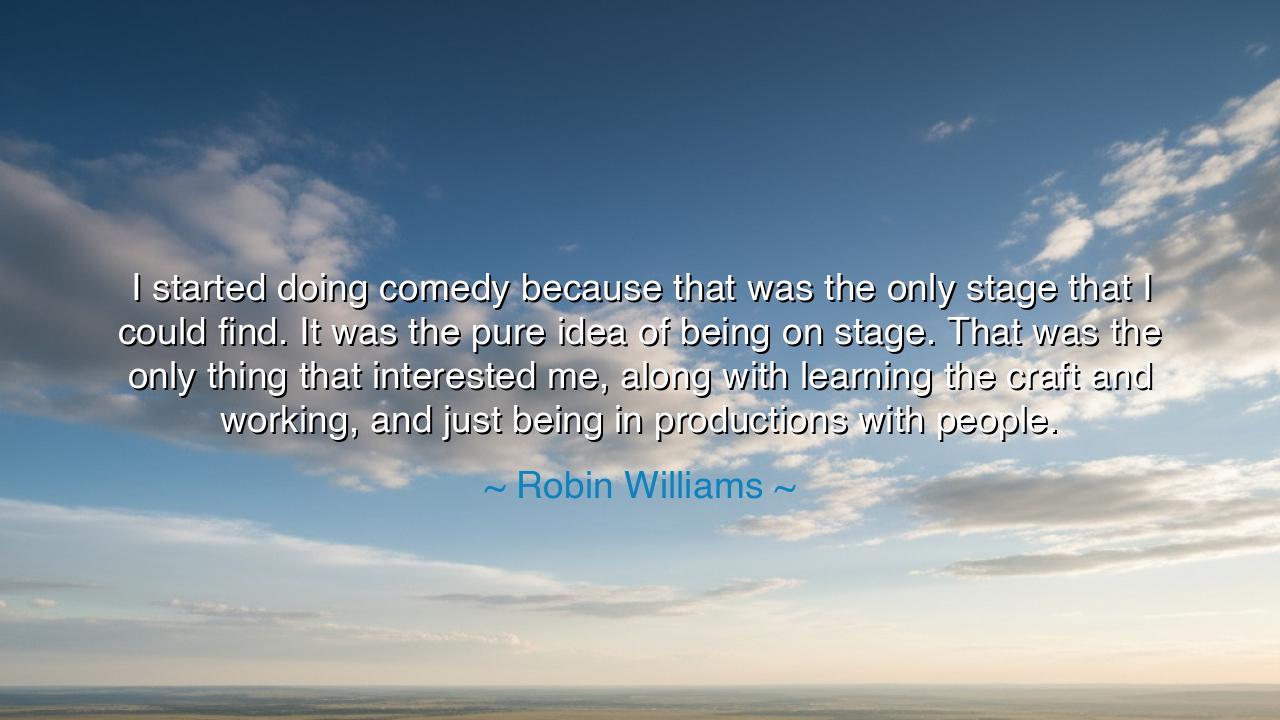
I started doing comedy because that was the only stage that I
I started doing comedy because that was the only stage that I could find. It was the pure idea of being on stage. That was the only thing that interested me, along with learning the craft and working, and just being in productions with people.






“I started doing comedy because that was the only stage that I could find. It was the pure idea of being on stage. That was the only thing that interested me, along with learning the craft and working, and just being in productions with people.” – Robin Williams
There are some souls whose light is so bright that even after they depart, the echo of their laughter still warms the world. Robin Williams was one such soul — an artist whose humor was born not of vanity, but of longing; not from ease, but from a boundless desire to create, to connect, and to learn the craft that gave his spirit voice. In this quote, he reveals the heart of every true artist: the hunger not for fame or applause, but for expression — the sacred act of being on stage, of standing before humanity and giving one’s heart in full measure.
When he says, “It was the only stage that I could find,” he speaks as one who was driven by necessity — by the irresistible pull to bring his inner fire into the world, even if the world offered him only a small, dimly lit corner to do so. It was not comedy itself that first called him, but the stage, that ancient altar where truth and imagination meet. For him, it was never about the jokes alone, but about the communion of souls — that invisible bridge between performer and audience where laughter becomes understanding, and joy becomes healing.
In ancient times, the theater was considered a temple, and the performer, a priest of emotion. The Greeks built open-air sanctuaries to Dionysus, where tragedy and comedy revealed the dual nature of life — sorrow and laughter as two halves of the same divine whole. In the same spirit, Williams stood upon his own modern stage, wielding laughter as both sword and balm. He worked not to escape pain but to transform it, to alchemize his vulnerability into laughter, and in doing so, he taught the world that even comedy can be an act of courage.
His words also speak of learning the craft, that devotion which separates the master from the imitator. He reminds us that greatness is not born in a moment of brilliance, but forged through labor, through rehearsal, through humility. The artist’s life is not one of ease but of endless study — of the human heart, of timing, of silence, of truth. Williams did not merely perform; he worked, he learned, and he grew alongside his peers, finding joy not just in the spotlight, but in the shared labor of creation.
There is a lesson here for all who dream — whether of art, science, or service. The true calling is not always revealed in grand design. Sometimes, one must begin with whatever stage can be found. A comedian’s microphone, a painter’s scrap of canvas, a singer’s empty room — each can become the birthplace of greatness if filled with sincerity. Do not wait for the perfect opportunity, for the perfect audience, for the world to grant you permission. Begin where you stand. Work. Learn. Create. And let the love of the craft be your compass.
Consider also the story of Charlie Chaplin, another genius of laughter. In his youth, he wandered the streets of London, penniless and hungry. Yet even then, he performed wherever he could — in music halls, in alleyways, in front of strangers. His stage was the world itself. And like Williams, he turned his suffering into art. His comedy was not escape but revelation, showing that the human spirit can dance even amid sorrow. Such is the legacy of those who begin not with glory, but with necessity — and who find in the act of creation their truest freedom.
Thus, Robin Williams’ words are not merely a memory of his beginning, but a testament to devotion. The pure idea of being on stage, of giving oneself to the moment, is the essence of artistry — and indeed, of life itself. For each of us stands upon a stage of our own: the classroom, the workplace, the home, the world. Whatever our role, the same truth applies — to show up, to give our best, to learn, and to connect with others in sincerity and love.
So remember this teaching, children of creation: do not seek greatness for its own sake. Seek meaning. Seek craft. Seek the joy of the work itself. The world may not always give you the grandest stage, but if your heart burns with purpose, even the smallest stage will shine beneath your feet. For it is not the size of the stage that makes the artist immortal — it is the courage to stand upon it.






AAdministratorAdministrator
Welcome, honored guests. Please leave a comment, we will respond soon